 THE LEGENDARY FEMINIST Susan B. Anthony (1820-1906) is too often the silenced queer elephant in the room of U.S. history. As we observe the 200th anniversary of her birth, which is on February 15th, it’s important to ask ourselves whether we as a society are finally willing to see her not only as a heroic fighter for women’s suffrage but also as a lesbian.
THE LEGENDARY FEMINIST Susan B. Anthony (1820-1906) is too often the silenced queer elephant in the room of U.S. history. As we observe the 200th anniversary of her birth, which is on February 15th, it’s important to ask ourselves whether we as a society are finally willing to see her not only as a heroic fighter for women’s suffrage but also as a lesbian.
Few historians, especially those reaching a mass audience, have discussed Anthony in the context of LGBT history. She is still straightwashed in most books, media depictions, cultural institutions, and classrooms throughout the U.S. There hasn’t been a major biography for adults since 1988, while more recent biographies and documentaries for young people predictably render her lesbianism invisible.
When I visited the Susan B. Anthony Museum & House in Rochester, New York, last summer, the tour guide insisted that Anthony and the queer women in her circle were heterosexual. I kept challenging the guide and asking questions, but was made to feel like a gay weirdo who needed to shut up so the tour could move on. Other staff members seemed equally insistent on maintaining the brick wall of heterosexist denial that the museum had erected.
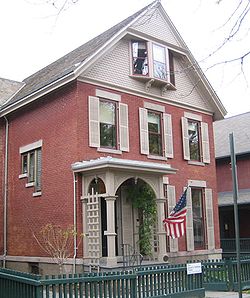
Part of the problem may be of Susan B. Anthony’s own making. She felt compelled to create a conventional public persona and made excuses for her unmarried status (never found the right man, etc.). She talked in interviews about not wanting to be trapped in a male-dominated relationship. But the real reason she never had a serious relationship with a man was that her passions were directed toward other women.
For example, her writings make it quite clear that in the 1860s Anthony became enamored of abolitionist orator Anna Dickinson, who was undoubtedly a lesbian. The youthful Dickinson was heralded as “America’s Joan of Arc”—an interesting association, given Joan’s gender ambiguity—for inspiring the Union forces to victory and speaking out for the abolition of slavery. Frederick Douglass credited Dickinson with being instrumental in moving racial equality legislation forward. This was a woman who stirred Anthony’s progressive heart on every possible level.
It is important to acknowledge that in her day-to-day life Anthony had close and supportive friendships with many prominent LGBT figures in the suffrage movement. She even had her own queer-blended extended family. Her beloved niece Lucy Anthony was the life partner of the great suffragist leader and spokeswoman Rev. Anna Howard Shaw. It was Shaw who was at Susan B. Anthony’s bedside as the great activist lay dying. We have lost this moment in the fog of straightwashed history, which highlights only Anthony’s deathbed pleas for assurance that the great work will go on, not mentioning that the torch of suffrage leadership was being passed from one lesbian to another.
I am aware that many contemporary academics argue that the very word “lesbian” is inappropriate for discussing earlier eras of the American past. The L-word may not have been widely used, but the denial of Anthony’s same-sex orientation plays into the homophobic strategies of those on the far Right.
For the record, I did eventually speak with the CEO of Anthony House and ended the conversation reassured that the museum is open to adopting a more honest and inquiring approach to America’s most famous suffragist. Time will tell. It will also be instructive to see if commemorations of Anthony’s bicentennial in the mainstream media are inclusive, or if they continue the sad history of queer erasure.
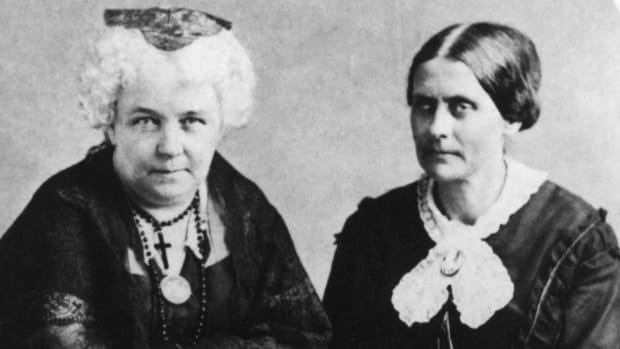
Susan B. Anthony is to be celebrated on this anniversary as a brilliant organizer and energizer of many progressive movements, from the abolition of slavery to women’s suffrage—but not excluding the de facto gay-straight alliance of suffragists that she and her best friend, Elizabeth Cady Stanton, spearheaded. As debates about voter suppression and manipulation rage on, Anthony’s persistence in fighting for every citizen’s unencumbered right to vote seems as relevant as ever, as does her queerness.
Sted Mays is a media agency founder and queer activist and contributor to The Gay and Lesbian Literary Heritage, edited by Claude J. Summers. He lives in Atlanta.


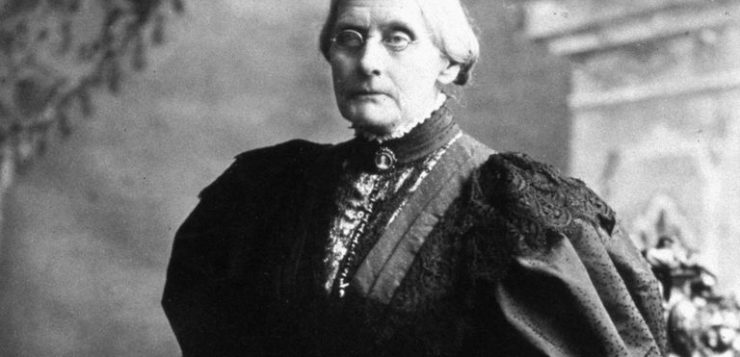

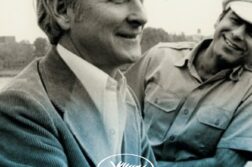
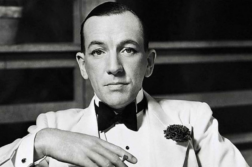

Discussion8 Comments
Excellent writing – much needed today. It is about time Susan B. Anthony and many of her fellow suffragettes be recognized as fully realized women who were eager to passionately loving each other!
Straightwashing is not a real word. Maybe people will stop doing it when we stop making up absurd terms.
GusW Languages are not static, otherwise they are dead. And when reality comes up against a linguistic void, new and very “real” words are “made up” as needed. Is “internet” a real word? It wasn’t when you were born. Added to the OED (a rather authoritative compendium of “real” words, wouldn’t you say?) in 2020 alone: A-game, denialist, garbageology, LOL, shero.
Whether you approve of “straightwashing” as a word, the concept is real, damaging and as old as the hills.
You can’t actually believe that straight people, including trained historians, will stop doing this erasure of gay history until we chastise them for it, can you? If you’re interested in an academician calling out fellow historians on their centuries of outright straightwashing and dishonesty, I’d suggest you take a look at John Boswell’s classic “Christianity, Social Tolerance and Homosexuality.” The academic dishonesty about gay people throughout history that Boswell documents is stunning, by whatever word you want to call it.
There is nothing “ambiguous” about Joan of Arc’s gender. There is speculation about her sexual orientation, but she was most definitely female. She cross-dressed for reasons of protection (primarily against rape) and of practicality.
Enjoyed the post, thank you! My go-to for the “real real” for Anthony and other prominent suffragists including Carrie Chapman Catt is Lillian Faderman’s “To Believe in Women. What Lesbians Have Done for America – A History.” Boston/New York: Houghton Mifflin, 1999.
I wonder if instead of gay, Susan B Anthony was asexual.
It would explain why she’d get upset when women who pledged to be single chose marriage (“Why not just stay single? I’m happy being alone, why aren’t you?”), and it would also explain why she had no viewpoint on abortion (if you are assuming the wife is just having sex because that’s what the man wants, then aiming to have equal rights for women in their marriage should fix any abortion problems – right? Then there’s no reason for women to ever get married, and the only time they’d need to have sex with a man is if they wanted a child).
I think her quote “I never found the man who was necessary to my happiness. I was very well as I was.” is about as asexual as someone gets. For some asexuals (such as myself) they like the idea of a relationship, but not the reality. Ms. Anthony could have been the same way. She could very well have had a very strong queer-platonic relationship with Elizabeth Stanton, just as likely as she could have had a lesbian relationship with her (though I think the lesbian relationship would have been harder to hide from Elizabeth Stanton’s husband, and would have likely eventually gotten Ms. Anthony’s guest pass rescinded).
You didn’t provide any evidence. I was hoping to find some, but you mention one quotation. Her niece’s life partner, rev. Anna Howard Shaw, being by her deathbed doesn’t prove anything.
Although, I always had a feeling the whole women’s rights movement was initiated by one or more gay/lesbian women. It really didn’t matter to me. My feelings or thoughts aside, the fact is, it happened and many have benefitted from it. It doesn’t matter the person’s sexual orientation. What matters is that they made a positive contribution to the world we now live in and we honor them for it.
Was Susan B. Anthony lesbian/asexual? Who knows? Maybe, that very thing is what gave her the grit to take on the equality fight. And the fact that she never openly expressed it, may be a protection mechanism or the thought was not that important to her.